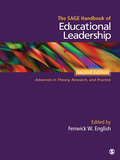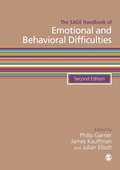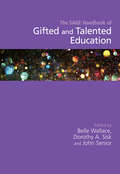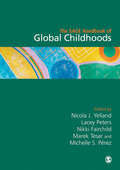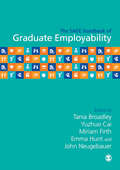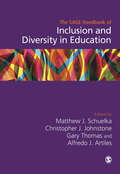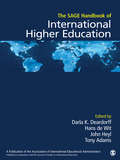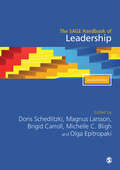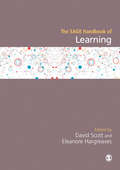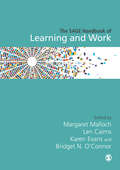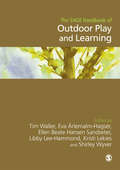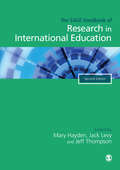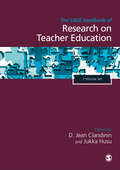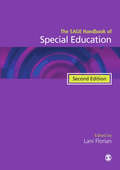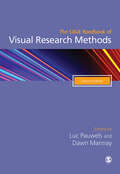- Table View
- List View
The SAGE Handbook of Educational Leadership: Advances in Theory, Research, and Practice (2nd Edition)
by Fenwick W. EnglishThis fully updated Second Edition offers an unflinching and comprehensive overview of the full range of both practical and theoretical issues facing educational leadership today. Editor Fenwick W. English and 30 renowned authors boldly address the most fundamental and contested issues in the field, including culturally relevant and distributed leadership; critical policy and practice issues predicting the new century's conflict; the paradox of changes; and the promises, paradoxes, and pitfalls of standards for educational leaders.
The SAGE Handbook of Emotional and Behavioral Difficulties
by James Kauffman Professor Julian Elliot Professor Philip Garner'This important revision with updated material will inform professionals, students, and the interested public of evolving international perspectives on EBD. New chapters consider causation, the influence and role of social contexts and social support, ADHD, teacher knowledge and parental engagement. The new content presents us with fresh ideas and approaches.' - Katherine Bilton, University of Alaska, USA This new edition of The Handbook of Emotional and Behavioural Difficulties, first published in 2004, has been completely reworked and refreshed by a new editorial team led by Philip Garner. A thorough revision of existing content, together with new material, bring the volume firmly up-to-date, and offers guidance and recommendations for future research and practice. Covering a range of important issues in EBD, chapters are organized into five main parts: Contexts, Definitions and Terminologies Roots, Causes and Allegiances Strategies and Interventions Training and Professional Development Enhancement EBD Futures - Challenges and Opportunities With an impressive array of UK, US and other international contributors, the Handbook will be indispensable for undergraduate and Master's level students pursing Teacher Training, Educational and Developmental Psychology and Special Education courses. It will also be valuable to social workers, counsellors, school (educational) psychologists and other practitioners in relevant fields.
The SAGE Handbook of Gifted and Talented Education
by John Senior Dorothy Sisk Belle WallaceThe SAGE Handbook of Gifted & Talented Education provides a comprehensive and international overview of key challenges and issues in the field of gifted education, making this an invaluable volume for individuals in the fields of education, public and private school administration, psychology and beyond. Containing contributions by a range of expert authors from around the world, chapters include discussions of the wide range of human abilities and talents which impinge upon academic success, with explorations of various political, social and economic factors which influence how ‘giftedness’ and ‘gifted education’ is defined and understood in different regions around the globe. PART 1. CONCEPTS OF GIFTEDNESS AND IDENTIFICATION: SOCIAL AND EMOTIONAL NEEDS PART 2: EDUCATIONAL PROVISION: PROGRAMS AND STRATEGIES PART 3: GLOBAL RESPONSES TO EMERGING G&T PROVISION: DEFINING THE FUTURE
The SAGE Handbook of Gifted and Talented Education
by John Senior Dorothy Sisk Belle WallaceThe SAGE Handbook of Gifted & Talented Education provides a comprehensive and international overview of key challenges and issues in the field of gifted education, making this an invaluable volume for individuals in the fields of education, public and private school administration, psychology and beyond. Containing contributions by a range of expert authors from around the world, chapters include discussions of the wide range of human abilities and talents which impinge upon academic success, with explorations of various political, social and economic factors which influence how ‘giftedness’ and ‘gifted education’ is defined and understood in different regions around the globe. PART 1. CONCEPTS OF GIFTEDNESS AND IDENTIFICATION: SOCIAL AND EMOTIONAL NEEDS PART 2: EDUCATIONAL PROVISION: PROGRAMS AND STRATEGIES PART 3: GLOBAL RESPONSES TO EMERGING G&T PROVISION: DEFINING THE FUTURE
The SAGE Handbook of Global Childhoods
by Marek Tesar Nicola J. Yelland Lacey Peters Nikki Fairchild Michelle S. PérezThis Handbook explores the multidisciplinary field of childhood studies through a uniquely global lens. It focuses on enquiries and investigations into the everyday lives of young children in the age range of birth to 8 years of age, giving space to their voices and involving interrogations about the various aspect of their lives. This Handbook engages with the interdisciplinary field of childhood studies, education, cultural studies, ethnography, and philosophy, with contributions from scholars from across the globe who have focused their work on the complexities of childhoods in contemporary times. By considering a range of epistemologies, ontologies and perspectives to present the contemporary & systematic research on the topic from a wide range of academics and authors in the field, this Handbook provides a significant contribution to the international dialogue of Global Childhoods. Part 1: Global Childhoods Part 2: Researching Global Childhoods Part 3: Contemporary Childhoods Part 4: Pedagogies and Practice Part 5: Creating Communities for Global Children
The SAGE Handbook of Global Childhoods
by Marek Tesar Nicola J. Yelland Lacey Peters Nikki Fairchild Michelle S. PérezThis Handbook explores the multidisciplinary field of childhood studies through a uniquely global lens. It focuses on enquiries and investigations into the everyday lives of young children in the age range of birth to 8 years of age, giving space to their voices and involving interrogations about the various aspect of their lives. This Handbook engages with the interdisciplinary field of childhood studies, education, cultural studies, ethnography, and philosophy, with contributions from scholars from across the globe who have focused their work on the complexities of childhoods in contemporary times. By considering a range of epistemologies, ontologies and perspectives to present the contemporary & systematic research on the topic from a wide range of academics and authors in the field, this Handbook provides a significant contribution to the international dialogue of Global Childhoods. Part 1: Global Childhoods Part 2: Researching Global Childhoods Part 3: Contemporary Childhoods Part 4: Pedagogies and Practice Part 5: Creating Communities for Global Children
The SAGE Handbook of Graduate Employability
by John Neugebauer Miriam Firth Emma Hunt Tania Broadley Yuzhuo CaiThis Handbook brings together the latest research on graduate employability into one authoritative volume. Dedicated parts guide readers through topics, key issues and debates relating to delivering, facilitating, achieving and evaluating graduate employability. Chapters offer critical and reflective positions, providing examples of a range of student and graduate destinations, and cover a wide range of topics from employability development, to discipline differences, gender, race and inclusion issues, entrepreneurialism, and beyond. Showcasing positions and voices from diverse communities, industries, political spheres and cultural landscape, this book will support the research of students, researchers and practitioners across a broad range of social science areas. Part I Facilitating and Achieving Graduate Employability Part II Segmenting Graduate Employability: Subject by Subject Considerations Part III Graduate Employability and Inclusion Part IV Country and Regional Differences Part V Policy Makers′ and Employers′ Perceptions on Graduate Employability
The SAGE Handbook of Graduate Employability
by John Neugebauer Miriam Firth Emma Hunt Tania Broadley Yuzhuo CaiThis Handbook brings together the latest research on graduate employability into one authoritative volume. Dedicated parts guide readers through topics, key issues and debates relating to delivering, facilitating, achieving and evaluating graduate employability. Chapters offer critical and reflective positions, providing examples of a range of student and graduate destinations, and cover a wide range of topics from employability development, to discipline differences, gender, race and inclusion issues, entrepreneurialism, and beyond. Showcasing positions and voices from diverse communities, industries, political spheres and cultural landscape, this book will support the research of students, researchers and practitioners across a broad range of social science areas. Part I Facilitating and Achieving Graduate Employability Part II Segmenting Graduate Employability: Subject by Subject Considerations Part III Graduate Employability and Inclusion Part IV Country and Regional Differences Part V Policy Makers′ and Employers′ Perceptions on Graduate Employability
The SAGE Handbook of Inclusion and Diversity in Education
by Gary Thomas Alfredo J. Artiles Matthew J. Schuelka Christopher J. JohnstoneThis handbook examines policy and practice from around the world with respect to broadly conceived notions of inclusion and diversity within education. It sets out to provide a critical and comprehensive overview of current thinking and debate around aspects such as inclusive education rights, philosophy, context, policy, systems, and practices for a global audience. This makes it an ideal text for researchers and those involved in policy-making, as well as those teaching in classrooms today. Chapters are separated across three key parts: Part I: Conceptualizations and Possibilities of Inclusion and Diversity in Education Part II: Inclusion and Diversity in Educational Practices, Policies, and Systems Part III: Inclusion and Diversity in Global and Local Educational Contexts
The SAGE Handbook of Inclusion and Diversity in Education
by Gary Thomas Alfredo J. Artiles Matthew J. Schuelka Christopher J. JohnstoneThis handbook examines policy and practice from around the world with respect to broadly conceived notions of inclusion and diversity within education. It sets out to provide a critical and comprehensive overview of current thinking and debate around aspects such as inclusive education rights, philosophy, context, policy, systems, and practices for a global audience. This makes it an ideal text for researchers and those involved in policy-making, as well as those teaching in classrooms today. Chapters are separated across three key parts: Part I: Conceptualizations and Possibilities of Inclusion and Diversity in Education Part II: Inclusion and Diversity in Educational Practices, Policies, and Systems Part III: Inclusion and Diversity in Global and Local Educational Contexts
The SAGE Handbook of International Higher Education
by Tony Adams Darla K. Deardorff Dr Hans De Wit Dr John D. HeylThe SAGE Handbook of International Higher Education examines the internationalization of higher education from a marginal to a core dimension of higher education worldwide. This mainstreaming of internationalization is a fascinating phenomenon: new concepts, programs, providers, and methods of delivery are emerging; impressive national and regional scholarship programs have been established; radical reforms have been undertaken to make higher education globally competitive; and mobility of students and scholars has increased around the world. This groundbreaking handbook serves as a guide to internationalization of higher education and offers new strategies for its further development and expansion in the years to come. With a decidedly global approach, this volume brings together leading experts from around the world to illustrate the increasing importance of internationalization. The text encompasses the diversity and breadth of internationalization of higher education in all its thematic facets and regional impacts.
The SAGE Handbook of Leadership
by Doris Schedlitzki Brigid Carroll Michelle C. Bligh Olga Epitropaki Magnus LarssonThe Second Edition of The SAGE Handbook of Leadership provides not only an in-depth overview the current field of leadership studies, but also a map into the future debates, innovations and priorities of where the field will move to. Featuring all new chapters from a global community of leading and emerging scholars, each chapter offers a comprehensive, critical overview of an aspect of leadership, a discussion of key debates and research, and a review of the emerging issues in its area. Featuring an innovative structure divided by prepositions, this brand-new edition moves away from essentializing boundaries, and instead seeks to create synergies between different schools of leadership. A key feature of the second edition, is the attention to sensemaking (exploring the current themes, structures and ideas that comprise each topic) and sensebreaking (disrupting, critiquing and refreshing each topic). Suitable for students and researchers alike, this second edition is a critical site of reference for the study of leadership. PART 1: Between: Leadership as a Social, Socio-cognitive and Practical Phenomenon PART 2: About: Exploring the Individual and Interpersonal Facets of Leadership PART 3: Through: Leadership Seen Through Contemporary Frames PART 4: Within: Leadership as a Contextually Bound Phenomenon PART 5: But: A Critical Examination of Leadership
The SAGE Handbook of Leadership
by Doris Schedlitzki Brigid Carroll Michelle C. Bligh Olga Epitropaki Magnus LarssonThe Second Edition of The SAGE Handbook of Leadership provides not only an in-depth overview the current field of leadership studies, but also a map into the future debates, innovations and priorities of where the field will move to. Featuring all new chapters from a global community of leading and emerging scholars, each chapter offers a comprehensive, critical overview of an aspect of leadership, a discussion of key debates and research, and a review of the emerging issues in its area. Featuring an innovative structure divided by prepositions, this brand-new edition moves away from essentializing boundaries, and instead seeks to create synergies between different schools of leadership. A key feature of the second edition, is the attention to sensemaking (exploring the current themes, structures and ideas that comprise each topic) and sensebreaking (disrupting, critiquing and refreshing each topic). Suitable for students and researchers alike, this second edition is a critical site of reference for the study of leadership. PART 1: Between: Leadership as a Social, Socio-cognitive and Practical Phenomenon PART 2: About: Exploring the Individual and Interpersonal Facets of Leadership PART 3: Through: Leadership Seen Through Contemporary Frames PART 4: Within: Leadership as a Contextually Bound Phenomenon PART 5: But: A Critical Examination of Leadership
The SAGE Handbook of Learning
by Dr Eleanore Hargreaves Professor David Scott"Profound and useful, readers will benefit from the systematic treatment of learning through superb scholarship. Cultural-philosophical-curricular-pedagogical-historical perspectives on learning, curriculum, pedagogy, and assessment, and learners make this collection unique." - Carol A. Mullen, Professor of Educational Leadership, Virginia Tech Learning is a fundamental topic in education. Combining traditional views of learning and learning theory with sociocultural and historical perspectives, this Handbook brings together original contributions from respected researchers who are leading figures in the field. The editors provide a insightful introduction to the topic, and the theories, frameworks, themes and issues discussed in the individual chapters are central to each and every learning episode. The Handbook is organized into four sections, each beginning with a short introduction: Philosophical, Sociological and Psychological Theories of Learning Models of Learning Learning, Curriculum, Pedagogy and Assessment Learning Dispositions, Life-Long Learning and Learning Environments
The SAGE Handbook of Learning
by Dr Eleanore Hargreaves Professor David Scott"Profound and useful, readers will benefit from the systematic treatment of learning through superb scholarship. Cultural-philosophical-curricular-pedagogical-historical perspectives on learning, curriculum, pedagogy, and assessment, and learners make this collection unique." - Carol A. Mullen, Professor of Educational Leadership, Virginia Tech Learning is a fundamental topic in education. Combining traditional views of learning and learning theory with sociocultural and historical perspectives, this Handbook brings together original contributions from respected researchers who are leading figures in the field. The editors provide a insightful introduction to the topic, and the theories, frameworks, themes and issues discussed in the individual chapters are central to each and every learning episode. The Handbook is organized into four sections, each beginning with a short introduction: Philosophical, Sociological and Psychological Theories of Learning Models of Learning Learning, Curriculum, Pedagogy and Assessment Learning Dispositions, Life-Long Learning and Learning Environments
The SAGE Handbook of Learning and Work
by Karen Evans Margaret Malloch Len Cairns Bridget N. O'ConnorThe first two decades of the 21st century have contributed a growing body of research, theorisation and empirical studies on learning and work. This Handbook takes the consideration of this topic into a new realm, moving beyond the singular linking of identity, learning and work to embrace a more holistic appreciation of learners and their life-long learning. Across 40 chapters, learners, learning and work are situated within educational, organisational, social, economic and political contexts. Taken together, these contributions paint a picture of evolving perspectives of how scholars from around the world view developments in both theory and practice, and map the shifts in learning and work over the past two decades. Part 1: Theoretical perspectives of learning and work Part 2: Intersections of learning and work in organisations and beyond Part 3: Learning throughout working lives and beyond Part 4: Issues and challenges to learning and work
The SAGE Handbook of Learning and Work
by Karen Evans Margaret Malloch Len Cairns Bridget N. O'ConnorThe first two decades of the 21st century have contributed a growing body of research, theorisation and empirical studies on learning and work. This Handbook takes the consideration of this topic into a new realm, moving beyond the singular linking of identity, learning and work to embrace a more holistic appreciation of learners and their life-long learning. Across 40 chapters, learners, learning and work are situated within educational, organisational, social, economic and political contexts. Taken together, these contributions paint a picture of evolving perspectives of how scholars from around the world view developments in both theory and practice, and map the shifts in learning and work over the past two decades. Part 1: Theoretical perspectives of learning and work Part 2: Intersections of learning and work in organisations and beyond Part 3: Learning throughout working lives and beyond Part 4: Issues and challenges to learning and work
The SAGE Handbook of Outdoor Play and Learning
by Professor Tim Waller Dr Eva Ärlemalm-Hagsér Dr Shirley Wyver Ellen Beate Hansen Sandseter Kristi S. Lekies Libby Lee-HammondThere has been a growing academic interest in the role of outdoor spaces for play in a child's development. This text represents a coordinated and comprehensive volume of international research on this subject edited by members of the well-established European Early Childhood Education Research Association Outdoor Play and Learning SIG (OPAL). Chapters written by authors from Europe, North and South America, Australasia and Asia Pacific countries are organised into six sections: Theoretical Frameworks and Conceptual Approaches for Understanding Outdoor Play & Learning Critical Reflections on Policy and Regulation in Outdoor Play & Learning Children's Engagement with Nature, Sustainability and Children's Geographies Diverse Contexts and Inclusion in Children's Outdoor Play Environments Methodologies for Researching Outdoor Play and Learning Links Between Research and Practice
The SAGE Handbook of Outdoor Play and Learning
by Professor Tim Waller Dr Eva Ärlemalm-Hagsér Dr Shirley Wyver Ellen Beate Hansen Sandseter Kristi S. Lekies Libby Lee-HammondThere has been a growing academic interest in the role of outdoor spaces for play in a child's development. This text represents a coordinated and comprehensive volume of international research on this subject edited by members of the well-established European Early Childhood Education Research Association Outdoor Play and Learning SIG (OPAL). Chapters written by authors from Europe, North and South America, Australasia and Asia Pacific countries are organised into six sections: Theoretical Frameworks and Conceptual Approaches for Understanding Outdoor Play & Learning Critical Reflections on Policy and Regulation in Outdoor Play & Learning Children's Engagement with Nature, Sustainability and Children's Geographies Diverse Contexts and Inclusion in Children's Outdoor Play Environments Methodologies for Researching Outdoor Play and Learning Links Between Research and Practice
The SAGE Handbook of Research in International Education
by Mary Hayden John Jeff Thompson Jack LevyThe landscape of international education has changed significantly in the last ten years and our understanding of concepts such as ‘international’, 'global' and ‘multicultural’ are being re-evaluated. Fully updated and revised, and now including new contributions from research in South East Asia, the Middle East, China, Japan, Australasia, and North America, the new edition of this handbook analyses the origins, interpretations and contributions of international education and explores key contemporary developments, including: internationalism in the context of teaching and learning leadership, standards and quality in institutions and systems of education the promotion of internationalism in national systems This important collection of research is an essential resource for anyone involved in the practice and academic study of international education, including researchers and teachers in universities, governmental and private curriculum development agencies, examination authorities, administrators and teachers in schools.
The SAGE Handbook of Research in International Education
by Mary Hayden John Jeff Thompson Jack LevyThe landscape of international education has changed significantly in the last ten years and our understanding of concepts such as 'international', 'global' and 'multicultural' are being re-evaluated. Fully updated and revised, and now including new contributions from research in South East Asia, the Middle East, China, Japan, Australasia, and North America, the new edition of this handbook analyses the origins, interpretations and contributions of international education and explores key contemporary developments, including: internationalism in the context of teaching and learning leadership, standards and quality in institutions and systems of education the promotion of internationalism in national systems This important collection of research is an essential resource for anyone involved in the practice and academic study of international education, including researchers and teachers in universities, governmental and private curriculum development agencies, examination authorities, administrators and teachers in schools.
The SAGE Handbook of Research on Teacher Education
by Dr D. Jean Clandinin Professor Jukka HusuThe SAGE Handbook of Research on Teacher Education offers an ambitious and international overview of the current landscape of teacher education research, as well as the imagined futures. The two volumes are divided into sub-sections: Section One: Mapping the Landscape of Teacher Education Section Two: Learning Teacher Identity in Teacher Education Section Three: Learning Teacher Agency in Teacher Education Section Four: Learning Moral & Ethical Responsibilities of Teaching in Teacher Education Section Five: Learning to Negotiate Social, Political, and Cultural Responsibilities of Teaching in Teacher Education Section Six: Learning through Pedagogies in Teacher Education Section Seven: Learning the Contents of Teaching in Teacher Education Section Eight: Learning Professional Competencies in Teacher Education and throughout the Career Section Nine: Learning with and from Assessments in Teacher Education Section Ten: The Education and Learning of Teacher Educators Section Eleven: The Evolving Social and Political Contexts of Teacher Education Section Twelve: A Reflective Turn This handbook is a landmark collection for all those interested in current research in teacher education and the possibilities for how research can influence future teacher education practices and policies. Watch handbook editors D. Jean Clandinin and Jukka Husu and handbook working editorial board members Jerry Rosiek, Mistilina Sato and Auli Toom discuss key aspects of the new handbook: https://www.youtube.com/watch?v=Yee8cZVakfc
The SAGE Handbook of Research on Teacher Education
by Dr D. Jean Clandinin Professor Jukka HusuThe SAGE Handbook of Research on Teacher Education offers an ambitious and international overview of the current landscape of teacher education research, as well as the imagined futures. The two volumes are divided into sub-sections: Section One: Mapping the Landscape of Teacher Education Section Two: Learning Teacher Identity in Teacher Education Section Three: Learning Teacher Agency in Teacher Education Section Four: Learning Moral & Ethical Responsibilities of Teaching in Teacher Education Section Five: Learning to Negotiate Social, Political, and Cultural Responsibilities of Teaching in Teacher Education Section Six: Learning through Pedagogies in Teacher Education Section Seven: Learning the Contents of Teaching in Teacher Education Section Eight: Learning Professional Competencies in Teacher Education and throughout the Career Section Nine: Learning with and from Assessments in Teacher Education Section Ten: The Education and Learning of Teacher Educators Section Eleven: The Evolving Social and Political Contexts of Teacher Education Section Twelve: A Reflective Turn This handbook is a landmark collection for all those interested in current research in teacher education and the possibilities for how research can influence future teacher education practices and policies. Watch handbook editors D. Jean Clandinin and Jukka Husu and handbook working editorial board members Jerry Rosiek, Mistilina Sato and Auli Toom discuss key aspects of the new handbook: https://www.youtube.com/watch?v=Yee8cZVakfc
The SAGE Handbook of Special Education: Two Volume Set
by Lani FlorianThe second edition of The SAGE Handbook of Special Education provides a comprehensive overview of special education, offering a wide range of views on key issues from all over the world. The contributors bring together up-to-date theory, research and innovations in practice, with an emphasis on future directions for the role of special education in a global context of inclusion. This brand new edition features: " New chapters on families, interagency collaboration and issues of lifelong learning " The UN Convention on the Rights of Persons with Disabilities " Policy reform proposals " Equity and social justice in education " The impact of new thinking on assessment " Issues and developments in classification " The preparation and qualifications that teachers need The Handbook's breadth, clarity and academic rigour will make it essential reading for researchers and postgraduate students, and also for practitioners, teachers, school managers and administrators.
The SAGE Handbook of Visual Research Methods
by Luc Pauwels Dawn MannayThe second, thoroughly revised and expanded, edition of The SAGE Handbook of Visual Research Methods presents a wide-ranging exploration and overview of the field today. As in its first edition, the Handbook does not aim to present a consistent view or voice, but rather to exemplify diversity and contradictions in perspectives and techniques. The selection of chapters from the first edition have been fully updated to reflect current developments. New chapters to the second edition cover key topics including picture-sorting techniques, creative methods using artefacts, visual framing analysis, therapeutic uses of images, and various emerging digital technologies and online practices. At the core of all contributions are theoretical and methodological debates about the meanings and study of the visual, presented in vibrant accounts of research design, analytical techniques, fieldwork encounters and data presentation. This handbook presents a unique survey of the discipline that will be essential reading for scholars and students across the social and behavioural sciences, arts and humanities, and far beyond these disciplinary boundaries. The Handbook is organized into seven main sections: PART 1: FRAMING THE FIELD OF VISUAL RESEARCH PART 2: VISUAL AND SPATIAL DATA PRODUCTION METHODS AND TECHNOLOGIES PART 3: PARTICIPATORY AND SUBJECT-CENTERED APPROACHES PART 4: ANALYTICAL FRAMEWORKS AND PERSPECTIVES PART 5: MULTIMODAL AND MULTISENSORIAL RESEARCH PART 6: RESEARCHING ONLINE PRACTICES PART 7: COMMUNICATING THE VISUAL: FORMATS AND CONCERNS
